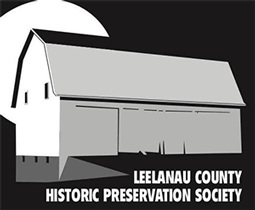A Story of the Leelanau County Infirmary (Poor Farm)
The above is not the name of an institution, although it is operated most efficiently as one by Mr. and Mrs. Charles Coleman. It is something more, it’s a home. Just a pleasant oasis for the aged and the infirm to rest as they walk down the Sunset Trail.
A happy and contented life for the aged has always been one of the world’s problems. Sometimes, houses become too crowded with the younger generation overflowing its banks, so a home must be found for the older and aged ones. Without any intent to be unkind, many children have had to look for a suitable place where their parents and other relatives could be cared for and made content. In the Leelanau County Infirmary, they find such a place.
Beautifully located in the place we call “Pleasant Valley,” every room is delightfully light and has a pleasant outlook on the green fields, beautiful trees and softly rolling hills. Cows graze in the Infirmary pastures, chickens go about their business of laying eggs for the Infirmary table and fine vegetables grow in the gardens.
When the Colemans took over 11 years ago, the sexes were segregated—no visiting was allowed, and thick screens were placed between these aged people. The Colemans soon did away with this segregation—the screens came down and the talking over old times and the old days, and visiting was encouraged. This one act alone will prove to you the wisdom these people exercise in running the affairs of the county infirmary.
Those who pay their way, and many do, could live in other homes if they chose, but they choose to live with the Colemans—as two of them told us, “they are such grand people—and the kindest ever.” To take care of the aged, to deal patiently with their sensitiveness and whims, and make them happy and content is no mean task—it is not something you learn—it is something you are born with, and Mr. and Mrs. Coleman have it to the nth degree.
The large farm on which the Infirmary is located, returns to the County each month, a certain portion of its expenditures. Over $500 was returned one month—this sum made up of sales of surplus and money from those who are paying guests. Under careful and efficient management these refunds are made possible. The guests are watched over with a care that never slackens or changes—at night there is always someone who listens for night bells and who makes the rounds to see that all is well. With labor shortage as it is, Mr. and Mrs. Coleman depend a great deal upon their young daughter of teen age, and their young son to help carry on. In winter, the rooms are always very warm and comfortable—we know, for we have called there on the coldest days to be greeted with a summer atmosphere.
There are many aged throughout the county who are hoping that they may find a room there, but space is limited and every room is taken at the present time.
Surely an institution of this kind, run by such kindly and efficient people, as Mr. and Mrs. Coleman have proven to be, plays a most important part in the county’s life and welfare. Some day it will have an annex or addition to take care of those who now wish to go there.
It is just what we say it is—a pleasant place to rest for those who are traveling the Sunset Trail.
—The Leelanau Enterprise, July 28, 1945
Reprinted here by permission of David Thornberry, Publisher of the Leelanau Enterprise, March 31, 2025

Nan Helm (1877–1968), from Burdickville, led a long and interesting life. Independent and strong-minded, she worked first as a music teacher, and after that pursued a business career as a stenographer, first in Chicago and then in Washington State. Returning to Leelanau County, she built a small house not far from the Leelanau County Poor Farm. Living close by, she came to know those who lived and worked there well. A 1945 article Nan wrote for the Leelanau Enterprise provides us with a description that we would not otherwise have of life at a place which provided a caring home for those in need for so many years. (Introduction written by Andy White, LCHPS Board Member).
